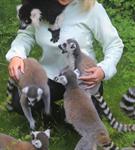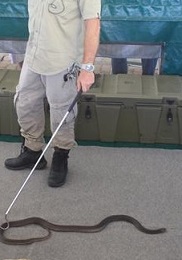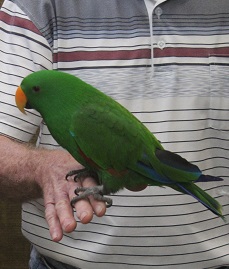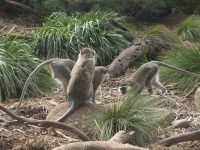Study zoo keeping, animal health care, Animal behaviour, vertebrate zoology and much more.
 Develop a strong foundation in animal science and management relating to working with wild animals.
Develop a strong foundation in animal science and management relating to working with wild animals.- Improve career advancement prospects or develop impressive 'entry-level' skills and knowledge to set yourself apart from other candidates.
- Lean on ACS' established tutoring faculty for industry advice, study support and professional development pathways.
Course Structure and Content
- Course Duration: 900 hours.
- Start Date: Start at any time - study at a pace that suits you, and with full tutor support for the duration of your studies.
- Modules: The course comprises of 5 Core Modules, plus 4 Elective Modules. Students will study a total of 9 modules.
Forming Relationships with Animals
 Part of being a zookeeper involves forming relationships with the animals in your care. Irrespective of whether those animals are small or large, harmless or dangerous; the people who care for them need to understand their behaviours and the psychology that underpins their formation of relationships. Forming a relationship is almost always easier when the animal is young; but that is not always going to be the situation you find yourself in.
Part of being a zookeeper involves forming relationships with the animals in your care. Irrespective of whether those animals are small or large, harmless or dangerous; the people who care for them need to understand their behaviours and the psychology that underpins their formation of relationships. Forming a relationship is almost always easier when the animal is young; but that is not always going to be the situation you find yourself in.
Here are some examples of specialised forms of learning that affect relationship development in animals.
Imprinting
This behaviour is a special process of attachment that can only occur during a specific short critical or sensitive period when an animal is born. It is said to occur when innate behaviours are released in response to a learnt stimulus with the purpose of promoting survival of newborn animals and of influencing their future breeding activities.
It was first described by Karl Lorenz who studied a group of Greylag geese. He observed that there is a brief period when the goslings are first born where they will huddle together but then become attracted to objects around them. In nature this will usually be the mother who leads them away from the nest but in the absence of the mother, Lorenz showed that the geese would follow and ‘imprint’ on him. It has subsequently been shown that ducks and geese will imprint on inanimate objects such as balls or boots. Although the dominant sense involved in imprinting is sight, sound and olfaction are also important.
Imprinting seems to be more important in precocial species (where the young are mobile soon after birth) which need to be able to stay with a moving parent for protection, rather than those where the mother stays at the nest or place of birth whilst the young are being fed. It has most commonly been described in ducks and geese, but it has also been observed in horses. Newborn foals will follow any large moving object (including humans) if the mare does not rise quickly after foaling. Mares may have developed a tendency to guard their foals against other animals or people who approach so as to prevent them from following the wrong animal.
 Imprinting-like phenomena are also involved in the social development of other mammals. Orphan lambs reared by humans will follow the humans about and may show little attraction towards other sheep. However, they may transfer their attention to other moving objects such as dogs, which suggests that the attachment is not as strong as imprinting in birds.
Imprinting-like phenomena are also involved in the social development of other mammals. Orphan lambs reared by humans will follow the humans about and may show little attraction towards other sheep. However, they may transfer their attention to other moving objects such as dogs, which suggests that the attachment is not as strong as imprinting in birds.
True imprinting is generally considered to be irreversible and the knowledge is retained for life. It can also influence the choice of mate, particularly in male birds who will seek out a partner who closely resembles the ‘mother’ that they imprinted on.
Maternal Bonding
The bond formed between the mother and her offspring is vital to ensure the survival of the young. Olfaction has a much greater influence in the bonding process although sight and hearing are also important. The timing of this is crucial during which the mother must accept her newborn and start lactation and maternal care. It is known that in many mammals including sheep, goats and cattle, the mother must smell and lick her young within the first hour of birth otherwise she will reject them.
The practice of fostering an orphan lamb onto a ewe whose lamb has died by covering it with the skin of the dead lamb and hence its familiar smell has long been used by farmers to help the ewe accept the strange lamb. Contact between a cow and her calf for just a 5 minute period after birth will lead to a strong bond. This strong reliance on smell should also be considered when handling very young animals as any strange ‘human’ scent may cause the mother to reject her offspring, especially in rodents.
Sows and piglets also use smell to identify each other but may take a few days to learn. Piglets can be fostered onto a sow until approximately two days after farrowing. After this time she will reject them on the basis of smell. Also piglets that are older than two days will vocalise and be reluctant to suckle a foster sow, as they have already made an attachment with their own mother.
In general, species that produce litters are more willing to accept and foster young, than those that produce one or two offspring. This is probably because the mother cannot discriminate so readily between individual offspring.
Socialisation

All young mammals pass through a developmental stage known as the socialisation period. This critical period occurs when the young animal’s sensory, motor and thermoregulatory systems are fully operational and they learn to move away from their mother and interact with others of the same and different species. This period varies according to species. In dogs it is from 3-10 weeks, in cats 2-7 weeks whilst in primates it is 6-12 months.
During this sensitive stage, they are open to new social encounters. They learn about communication and appropriate social interaction. Later, as the socialisation period draws to a close, they become increasingly wary of strangers and novel situations. The social experiences during this critical period set them up to differentiate friend from foe for the rest of their lives. The socialisation period of wild cats and wolves lasts only a few days, after which the animal becomes fearful of anyone that doesn't look like its mother or litter mate. However, with domestic dogs and cats, this period seems to have got much longer.
How an Advanced Certificate is assessed
The Advanced Certificate in Zoo Keeping requires approximately 900-hours of study. It is made up of eight 100-hour modules and a workplace project lasting 100 hours
To pass the course –
- Pass all assignments on the eight 100-hour modules. There will be an assignment at the end of each lesson to submit to your tutor for marking and feedback.
- Pass eight examinations – one on each module. These are usually taken at the end of the module and can be arranged at a time and location to suit you.
- Complete a Workplace Project. The project should last around 100 hours. There are four options available to you to satisfy this requirement. Don’t worry if you are not sure at this stage, your tutor will be there to help you every step of the way. This includes evidence of work experience or other studies or workshops, a research project or completion of Workshop I.
Why Study with ACS?
Design your own learning pathway.
Study at your own pace, from anywhere, at any time.
Receive prompt, expert support from our team of committed and friendly tutors.
Your learning is our priority. We are flexible and adaptable to meet your educational needs!
Enrolling is easy - just go to the top of this page and select your study method and payment option.
If you have any questions about studying with ACS, or want to know more about any of our courses, get in touch with our specialist tutors today.
They will be happy to answer your questions and look at different study options to fit in with your goals.